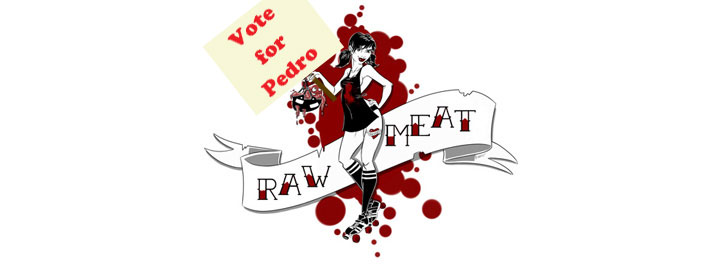October 17: Skate. October 19: Vote!
 This Saturday, join Raw Meat Roller Skating to learn to roller skate, roller derby-style. On Monday, Oct. 19, vote in the federal election.
This Saturday, join Raw Meat Roller Skating to learn to roller skate, roller derby-style. On Monday, Oct. 19, vote in the federal election.
Why should you do both things? Well, at their heart, roller derby and politics have a lot in common. They are both full-contact sports that attract passionate, committed players (who frequently stink to high heaven). Here’s another five things that voting and derby share:
- Nothing gets better if you don’t show up
Want to master the t-stop? Power slide? Crossovers? The funky chicken? No matter what skating move you want to learn, showing up to practice will get you there faster that sitting on the couch thinking about it.
Politics is the same. If you don’t participate in the system, you can’t drive the change you want.
Change can be slow. I’ve seen skaters work for years to build the skills they need to succeed on a team. By showing up consistently, week after week, month after month, they are now fantastic derby players (and sure as hell beat the crap out of everyone sitting at home).
In politics, change can come at a glacial pace. For example, the Green Party was founded in 1983, but didn’t send its first elected MP to Ottawa until 2011. This election, they could win several seats. If you believe in something, keep working at it, and change will happen.
- Youth have the advantage.
If you are a derby player over 30 and you’ve ever watched junior derby, you’ll know the sad, terrifying truth. Those kids are going to hand you your ass on a plate.
In skating, youth have the advantages of speed, strength, agility, and resilience. Adults benefit from strategy and guile. It’s exactly the same in politics. There’s a reason the Harper government stopped Elections Canada from efforts to promote youth voting. The lowest voter turnout in the 2011 election was among people 18-24 (around 40%), and the Conservatives won the election by a little over 6,000 votes. The youth vote could have made all the difference. On Oct. 19, show up, exercise your democratic rights, and scare the crap out of your elders.
- Sometimes, you land on your butt.
The first law of roller skating states: you WILL land on your ass from time to time. The second law says: when you do, just pick yourself up and keep on skating.
In politics, there will be scandals. Your candidate will lose. Someone you vote for will renege on a campaign promise, or say something stupid. Something you believe in deeply might not pass. That doesn’t mean your vote didn’t matter, and it doesn’t mean you should give up.
In skating, voting, or in life generally, you will land on your ass from time to time. You can’t prevent that. All you can do is keep getting back up.
- Every point matters
Roller derby is basically a first-past-the-post system. The team with the most points wins, whether the score is 11-10, or 378-7. In both scenarios, there’s one winner, and one loser, but are those two bouts equivalent? Of course not.
Politics is exactly the same. There’s a vast difference between winning a seat by a handful of votes, and winning it by a landslide. That’s why WFTDA counts the point spread as well the winner when they calculate their rankings.
People frequently complain that their vote is wasted if their candidate looses. Now, while I concede that FPTP is a broken system, every vote still matters. The number of people voting for a given party shows the strength of the support for that platform, and helps guide decisions going forward.
Just can’t stomach any of the options? Spoil your ballot. It would be lovely if Canada had a formal way to vote for no confidence in any of the choices, but right now, we don’t. However, they do track the number of spoiled ballots.
Voter turn out in the 2011 election was 61.1%. Can you imagine if 40% of the population came to the polls and scratched their ballots? Whoever won, that would certainly send a message.
TLDR: On Saturday, come join us and skate. On Monday, vote. Deal?